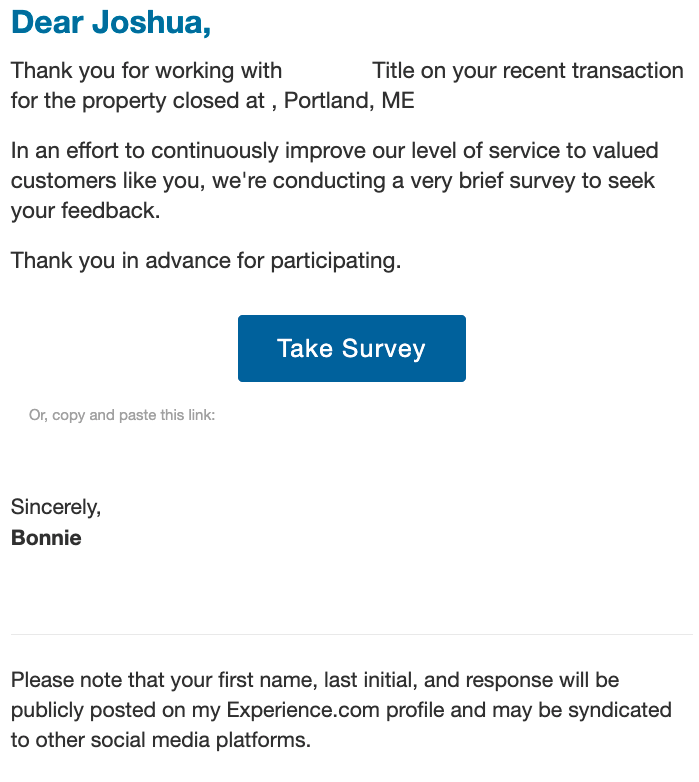Ask for feedback or reviews . . . but not both in the same survey
You can use customer contact information to request feedback, or collect text for posting in an online review. But doing both in the same question, like so many “efficient” strategies, is bound to backfire.
A disclaimer that undermines trust
I recently worked with a title company to manage the purchase of a new home. Home buying is a complex transaction, involving financing, deeds, taxes, agent fees, and many other details. I was extremely pleased with the work of the title company, which managed the process well, dealt deftly with changes in schedule, responded quickly to my questions, and conducted the actual closing and signing of documents efficiently and respectfully. Since buying a home is a major transaction, having that level of confidence is a definite plus.
So when they requested my feedback, I was eager to volunteer positive information. But one question threw me. Here’s a screen capture of that survey question:

The part in the box was what I typed. But then I got a look at the disclaimer, which is suspiciously presented in small, grey type.
Here’s the questionable text:
Please do not include information you do not want publicly posted. By submitting you authorize the sharing of your name, rating and review on social media and other web pages.
All of a sudden, my confidence in the company evaporated. Were they conducting customer research or soliciting endorsements? I looked back at the email they sent, and it reflected the same ambiguity.

If you read the first part, it appears that they’re conducting surveys to gather feedback, while the part at the end says, hey, what the heck, we might just post your response publicly, too.
Public and private feedback are completely different
If I send information to a company for feedback purposes, I expect them to use the information only internally. My desire to be completely honest depends on that — I might be very open about both positive and negative elements of the experience, but shy about telling the world I felt that way.
If you only gather feedback from people willing to have their information posted publicly, then your survey results will be skewed. You’ll only be hearing from people who feel confident enough about their responses, and open enough about their feelings, to allow public posting. It’s hard enough to get accurate feedback. Collecting it this way ensures that you’ll hear too much from extroverts and not enough from introverts.
So such a survey is of limited use for improving customer experience.
It’s also a bad way to generate reviews. I don’t want the company examining my review and deciding whether to post it. I want to do that myself. By filtering the feedback through its own system, the company will end up posting only positive reviews. And as a result, again, they demonstrate that they’re behaving in a trustworthy way.
This is bad behavior for any company, but especially for a company involved in financial transactions or any other industry where trust is paramount.
How to do this right
There’s an easy fix. First ask for honest feedback. Then, after the person volunteers the feedback, link them to sites where they can post reviews. You can even pre-populate the reviews with the text that the customer typed.
Do that, and you eliminate the skew in the feedback and encourage online reviews without the conflict of motives. You may get fewer reviews, but you’ll get more value from the survey data — and you won’t burn the trust your company runs on.
Also, they only asked for what went well or what you liked…
So much to this – the thing that really jumps out to me is the public facing portion of the ask is framed as “what went well or what you liked”. Useless content that only makes the asker feel better about themselves…because, at it’s core,
1) Feedback is for internal use. We (as a vendor) should want constructive feedback so we can adjust, improve & optimize. By asking a customer for feedback, you’re asking for the customer’s constructive opinions about if said customer were in your shoes, what should you know so you can be better.
2) Reviews are for external use – and reviews are only useful for their context – not their glowing selling content. You’re asking for constructive thoughts that will help others make better decisions.
Better decisions? That relates to how we, as human beings, make decisions.
We all (>99% as of the last research) read reviews when making a purchase of medium-to-high consideration when it is something we’ve never purchased before. Our brains require them to predict. To predict, we must be able to answer the question, “Is the juice going to be worth the squeeze?” We know, subconsciously, that perfection can’t possibly be reality, which is why > 85% of seek the negative reviews first. Without an understanding of the “squeeze” – in terms of downsides, alternatives, journey to the reward, etc., we can’t effectively process & utilize the positives in our decision making.
If there are no negative reviews, we buy less often. A product with an average review score of 4.2-4.5 is optimal for purchase conversion. There’s a company you may have heard of that embraced this idea first – and have done pretty well…Amazon.
So, in the end, the strategy you describe helps no-one. They learn nothing, and their future customers’ decision processing will likely be slowed along with it.